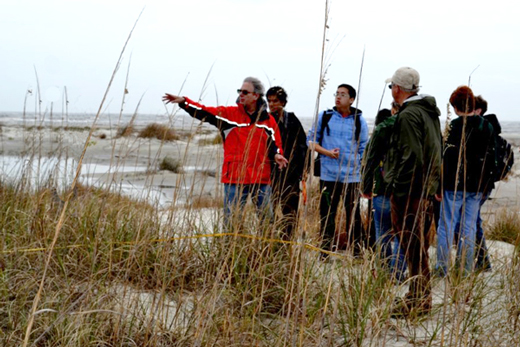Studying coastal biology on Georgia's barrier islands, exploring questions of identity through museum exhibits, and reading memoir with state prisoners: these are just some of the opportunities for Emory undergraduates to enrich classroom learning with hands-on experience.
Browse this sampling of classes drawn from the spring semester course offerings for Emory College of Arts and Sciences, Oxford College and Goizueta Business School to discover how Emory professors are using innovative teaching methods and uncommon course materials to engage students directly with specialty subjects.
Black Odyssey, Black Migration
Instructors: Dwight Andrews, associate professor of music theory and Mark Sanders, professor of African American studies and English and chair of African American Studies
Cool factor: Ties in with Michael C. Carlos Museum exhibit of Romare Bearden's collages and watercolors based on Homer's epic poem "The Odyssey." Also ties in with the related exhibit, "Southern Connections: Bearden in Atlanta" that features materials from Emory's Manuscript, Archives, and Rare Book Library (MARBL).
Course description: Examines artistic interpretations of African American identity through music, literature, film and the visual arts, notably including the campus exhibit of Romare Bearden's Odysseus series and the related exhibit about the artist's regional connections that draw on resources from Emory's special collections. A meditation on the Western epic tradition and African American mobility, the series invites a broader examination of African American culture and issues of migration, escape, home and belonging.
Department: African American Studies; cross-listed in Music
Coastal Biology with Lab
Instructor: Leslie A. Real, Asa Griggs Candler Professor of Biology
Cool factor: Field trip to study preserved areas of the Georgia coast.
Course description: Introduces students to coastal Georgia's major ecosystems and to plant and animal communities through an intensive field experience on St. Simon's, Cumberland, Blackbeard, Sapelo and Jekyll islands. Includes excursions in small boats to Blackbeard Island and on the Georgia Department of Natural Resources' research trawler, "Anna," to study organisms in the sound surrounding the islands.
Department: Biology
Freshman Seminar: Vaccines and Society
Instructor: Elena Conis, assistant professor of history
Cool factor: First-year students study vaccines on the campus of a leading research university and in proximity to the U.S. Centers for Disease Control and Prevention.
Course description: Explores the history of vaccination against infectious diseases such as smallpox, polio and measles as well as the opposition among some groups to vaccines. Uses these case examples to think critically about the state’s interest in protecting public health and about the nature of medical controversies.
Department: History; cross-listed with Human Health Program
MLK: Lessons from the Movement
Instructor: Bernard Lafayette Jr., Distinguished Senior Scholar-in-Residence at Candler School of Theology
Cool factor: Theory-practice course on nonviolence with an instructor who played instrumental roles in the 20th century civil rights movement.
Course description: Analyzes the conduct of select movements from the 20th century nonviolence struggle for lessons that students can use to develop proposals for nonviolent solutions to current global, national and local problems.
Department: Religion; cross-listed with African American studies
Risk & Resilience in Shaping Identity
Instructors: David Lynn, Asa Griggs Candler Professor of Chemistry and Biology, and chair of chemistry department and Leslie Taylor, professor of theater studies and director of the Center for Creativity and Arts.
Also, graduate students Julia Haas, philosophy; Brian Dias, behavioral neuroscience and psychiatric disorders; Carolina Campanella, psychology; Constance Harrell, neuroscience; Ashley Coleman, religion; Daniel Pierce and Jillian E. Smith, chemistry.
Cool factor: Interdisciplinary capstone course, combining aspects of science, technology, engineering, arts and mathematics, that helps seniors capture their liberal arts experience in a research university and allows them to present their lessons through novel artistic expressions.
Course description: Helps students ask, “What has made me a stronger, smarter and more resilient student at Emory University and what strengths have allowed me to successfully navigate college?” Provides them with an opportunity to develop a research idea for possible funding while being mentored on grant proposal writing and research design.
Department: Senior Seminar
Reading Memoir in Prison
Instructor: Stacy Bell, senior lecturer in English
Cool factor: A theory-practice service learning course that pairs Oxford College students with state prisoners as peer readers of personal memoir.
Course description: Invites students interested in fields ranging from law to psychology to sociology to creative writing to share individual narratives in a nontraditional class setting, with several classes held at the Lee Arrendale State Prison in Alto, Ga.
Department: English, Oxford College
The Romans
Instructor: Henry Bayerle, associate professor of classics
Cool factor: A theory-practice service learning course in which students relate their study of ancient poetry about war to the contemporary real world by interviewing U.S. veterans who have served in conflicts ranging from World War II to Iraq and Afghanistan.
Course description: Uses data and insights from veteran interviews to analyze both the significance of the literature of war in ancient Roman society and the ways in which ancient literature can help us understand our world today. Themes include ideals of leadership, the role of emotions on the battlefield and afterwards, and the impact of war on families and relationships.
Department: Classics, Oxford College
Digital and Social Media Strategy
Instructor: David Schweidel, associate professor of marketing
Cool factor: Hands-on experience with social media monitoring.
Course description: Analyzes digital marketing tactics and how they fit within a firm’s marketing strategy. Develops skills in monitoring social media and incorporating insights into marketing plans.
Department: Marketing, Goizueta Business School

